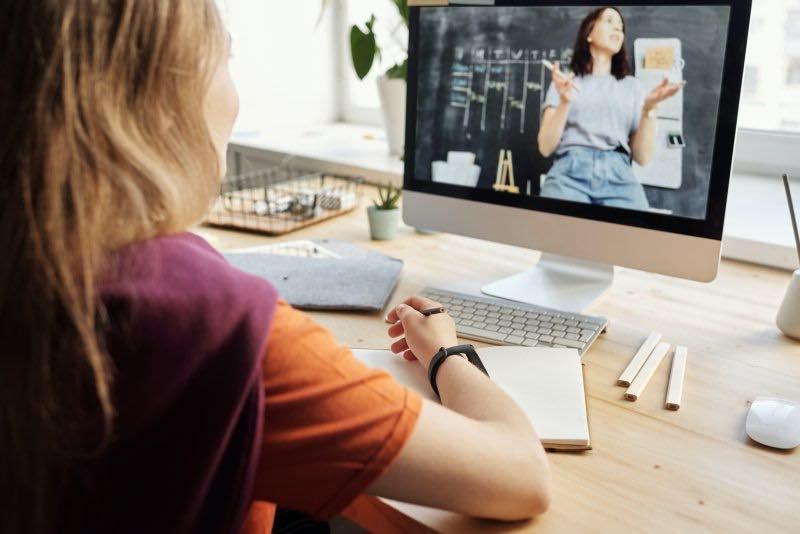Nearly a year has passed since the pandemic transformed the way we all work, learn, and communicate with each other. The switch to an online operating system intimidated many of us at first and the learning curve was steep.
Who had ever heard of Zoom or Microsoft Teams before March 2020? As a music teacher, I had only taught two virtual lessons prior to March 2020. After a few weeks of frustration during the adaptation period, I realized that distance learning offers many benefits. Switching my mindset to see the opportunities of distance learning rather than be stunted by its restrictions revealed the learning platform’s unique qualities such as:
- Health benefits: no exposure to people outside your household
- Convenience: no commute creates schedule flexibility and saves gas money
- Not bound by location: student can learn from anywhere
- Easier transition time between classes or lessons
- No excuses for forgetting materials
- Easy access to guardians and parents
- Easy sharing of materials via screen share
- Easily record lessons for reference
- Requiring recorded submissions encourages self-evaluation and develops listening skills
I could go on, but for the purpose of this article I will highlight the items listed above.
Health benefits
The most important benefit of distance learning is that it keeps us safe. Not having to commute or be in close proximity with people outside your household during a pandemic greatly reduces the spread of disease.
Convenience
It goes without saying that not having to commute to lessons preserves time, money, and peace of mind. When I taught private oboe lessons in the Austin public school system I would travel all over the city and outer suburbs to teach at five different schools. Now, I can teach students from all over the country from the comfort of my home studio and put that gas money into my savings account.
Location is not a limiting factor
Just as the online platform eliminates the commute, another benefit of distance learning is that it creates more resources for both the student and teacher. Without the limitation of having to travel to a specific location, students have greater access to subject matter experts and teachers have access to students across the country. Two weeks ago I presented a virtual masterclass for oboe students at Baylor University without having to leave my living room!
Easier transition time between classes and lessons
With no commute, both the student and teacher can easily switch between online learning activities. Instead of having to rush from school to their teacher’s house for a cello lesson, the student can access their lesson with the click of a button. Similarly, the teacher can teach all of their lessons from the comfort of their home studio instead of rushing all around town fighting traffic and scrambling to find a parking spot.
No excuse for forgetting materials
When all educational and musical lessons are in the home, students can no longer use the “I left my book/instrument/music etc. at home” excuse. However, I suppose the “My dog ate my homework” excuse could still be valid :-P.
Easy access to parents and guardians
Being able to talk directly to the parent or guardian in the middle of, before, or after the lesson is extremely beneficial for the teacher. Distance learning allows the teacher to directly inform the parents/guardians of the student’s progress, assignments, and to intervene if a disciplinary issue occurs. Also, the face to face video communication between the teacher and parent fosters closer relationships and collaborative learning than email or text message correspondence.
Access to materials via Screen Share
An incredible benefit of distance learning is the screen share function. Teachers and students can access a wide variety of documents, sheet music, recordings, etc. without having to remember to bring the physical materials to the next lesson. Being able to present slides on google docs or annotate music via screen-share while maintaining video contact with students is incredibly convenient.
Recorded submissions/ lessons encourage self-evaluation and develop listening skills
While a major drawback of the pandemic has been a lack of live musical performance and collaboration, recorded musical performances and evaluations encourage music students to develop critical listening skills and rapidly develop their ability to self-evaluate. I encourage all my students to take advantage of the ability to easily record their lessons on Zoom so they can listen back, evaluate their performance, and catch instructions or feedback they may have missed during the live lesson.
Distance learning also requires students to submit recorded jury/recitals and undergo a rigid process of self-evaluation. The process of recording puts the student’s playing under a microscope because they must analyze how they actually performed rather than base their opinion on a memory of how they performed. Listening objectively to their performance recordings encourages the student to quickly identify their strengths and weaknesses. Similarly, having performance recordings allows the student and teacher to easily and objectively track the student’s progress over the course of the year.
Clara Blood

